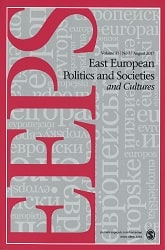Communism Equals or Versus Nazism? Europe’s Unwholesome Legacy in Strasbourg
Communism Equals or Versus Nazism? Europe’s Unwholesome Legacy in Strasbourg
Author(s): Aleksandra Gliszczyńska-GrabiasSubject(s): Human Rights and Humanitarian Law, Law and Transitional Justice, Political history, Government/Political systems, Politics and law, Comparative politics, History of Communism, Fascism, Nazism and WW II, Politics of History/Memory
Published by: SAGE Publications Ltd
Keywords: memory; transitional justice; totalitarian regimes; militant democracy; European Court of Human Rights;
Summary/Abstract: The accession of post-communist states into the Council of Europe system enlarged greatly the territory of effective protection of human rights in Europe and at the same time compelled the European Court of Human Rights to address the current effects of past violations of human rights by communist regimes. It gave the Court an opportunity to establish a legal standard of how to deal with matters such as the public presence of communist symbols and insignia, de-registration of neo-Communist parties, and the relevance of past membership in the Communist parties for an exercise of electoral rights in a newly democratized state. This opportunity was at the same time a challenge, and the Court was less than successful in meeting this challenge, despite the fact that it had already established the relevant legal standards when deciding about the cases triggered by the Nazi past. Without making it explicit, and without articulating openly the relevant differences, the Court has not established any equivalence between legal treatments of the aftermath of the two types of criminal regimes in the European recent past. The article discusses three recent cases belonging to these categories and concludes that there is a clear contrast between the Court’s treatment of “post-ommunist” cases and the same Court’s earlier treatment of equivalent “post-Nazi” cases; the article offers some explanations for the discrepancy which reflects a broader dualism in European collective memory of the past.
Journal: East European Politics and Societies
- Issue Year: 30/2016
- Issue No: 01
- Page Range: 74-96
- Page Count: 23
- Language: English
- Content File-PDF

